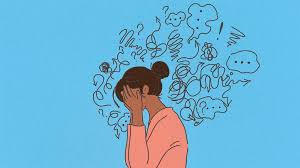Often compared to a silent storm, anxiety may have a significant impact on our lives and thoughts. It is a vast and complex experience that affects every part of who we are, including our relationships, physical health, and mental and emotional states. Anxiety has become a more widespread problem in today’s fast-paced, highly connected world, necessitating a deeper understanding of the condition as well as practical coping mechanisms.
Knowledge of Anxiety:
Fundamentally, anxiety is a normal reaction to stress or a sense of impending danger that has its roots in our evolutionary past. It sets off the body’s fight-or-flight reaction, readying us to either confront or flee potential dangers. Although in true emergencies this response may be life-saving, it becomes problematic when triggered by routine events or recurring concerns. Numerous physical symptoms, including headaches, tense muscles, and digestive problems, as well as emotional and cognitive problems, including incessant concern, anger, and difficulty concentrating, can result from chronic anxiety.
Anxiety Disorder Types:
There are several ways that anxiety can appear, and each has its own special traits. While panic disorder is characterized by abrupt, acute episodes of dread known as panic attacks, generalized anxiety disorder (GAD) is characterized by excessive, uncontrollable worry about a variety of issues. certain phobias are extreme dread of certain things or circumstances, whereas social anxiety disorder is characterized by a fear of social situations and possible embarrassment. To choose the best coping mechanisms and therapies, it is essential to comprehend these differences.
Risk factors and triggers:
Numerous factors, such as a person’s genetic susceptibility, brain chemistry, personality traits, and life experiences, can cause anxiety. Anxiety can arise as a result of traumatic experiences, ongoing stress, and big life transitions like moving, starting a new career, or losing a loved one. Furthermore, several drugs and physical conditions might make anxiety symptoms worse. Finding these risk factors and triggers is a critical first step toward effective anxiety management.
Techniques for Getting Rid of Anxiety:
Even though anxiety can feel overpowering, there are a lot of techniques to assist control and lessen its effects. Here are a few successful strategies:
Cognitive-Behavioral Therapy (CBT):
CBT is a well-known and successful anxiety treatment. It entails recognizing and combating unfavorable thought patterns and actions that fuel anxiety. Through cognitive behavioral therapy (CBT), people can learn to reframe their ideas, create healthier coping strategies, and eventually face their fears in a safe and encouraging setting.
Meditation and mindfulness:
By keeping people anchored in the here and now, mindfulness techniques like meditation might lessen people’s propensity to dwell on anxieties from the past or the future. Mindfulness can lower general stress and anxiety levels by encouraging a sense of clarity and calm by keeping one’s attention in the present moment.
Physical Activity:
Research has indicated that consistent exercise might lessen anxiety symptoms and enhance mental wellness in general. Engaging in physical activity helps control stress chemicals like cortisol and releases endorphins, which are naturally occurring mood enhancers. Including physical activity in your daily routine, whether it be through yoga, running, or just taking a stroll in the park, can significantly help with anxiety control.
Healthy Lifestyle Options:
Keeping up a healthy lifestyle can be very important for anxiety management. This entails maintaining a healthy diet, getting enough sleep, and abstaining from drugs and alcohol that could make anxiety worse. A solid basis for mental well-being can be established by placing a high priority on self-care and making sure that work, rest, and play are all balanced.
Support Systems:
Establishing a robust support system is crucial for effectively managing anxiety. Speaking with loved ones, friends, or mental health specialists can offer insightful viewpoints and support. In addition to providing a sense of community and shared experience, joining online forums or support groups can also help people feel less alone.
Medication:
Medication may be an essential part of the therapy of anxiety for certain people. Often prescribed to help manage symptoms are beta-blockers, antidepressants, and anxiety medicines. It’s critical to collaborate closely with a healthcare professional to determine which drug and dosage are best for your individual needs.
Getting By in the Modern World:
The particular difficulties of modern life can increase anxiety stress . Stress levels can be raised by the constant barrage of information, the pressure to succeed, and the rapid speed of technological advancement. Setting limits and giving self-care first priority will help you deal with these difficulties. This could entail establishing screen time limitations, engaging in digital detoxes, and designing a well-balanced schedule that provides opportunity for leisure and rest.
Developing a feeling of meaning and purpose can also act as a protective barrier against the stressors of contemporary living. Taking part in values-based activities, including volunteering, taking up a hobby, or spending time with loved ones, can make you feel resilient and fulfilled.
In summary:
The silent storm that is anxiety can feel unrelenting and overwhelming, but it can be managed and its effects lessened by being aware of its nature and putting useful tactics into practice. Through identification of triggers and risk factors, application of therapeutic treatments such as CBT and mindfulness, and prioritization of a healthy lifestyle and support systems, people can more effectively and peacefully negotiate the demands of contemporary life. Adopting these techniques enables people to flourish in the midst of hardship in addition to promoting personal development and well-being and reducing worry. Remind yourself that you are not alone in your fight against anxiety and that there is always hope and support accessible.
